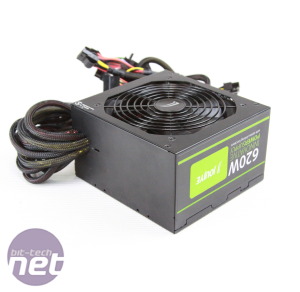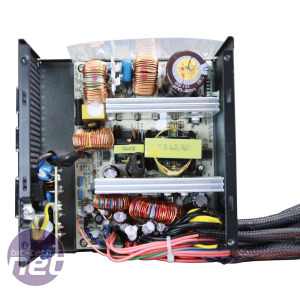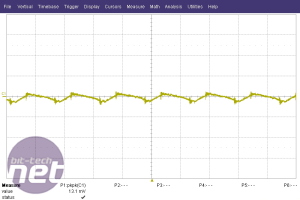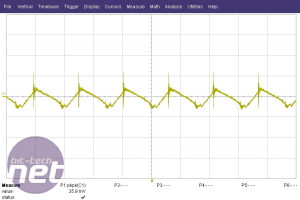What is the Best 600W+ PSU?
September 21, 2011 | 14:19
Companies: #antec #be-quiet #bit-tech #corsair #cougar #enermax #fsp #seasonic #silverstone #thermaltake

Jou Jye BW-B620JL Review
Manufacturer: Jou JyeUK price (as reviewed): MSRP £80 (inc VAT)
US price (as reviewed): Unknown
You may not have heard of Jou Jye before now, but the company has been around since 1997 and is primarily known for manufacturing PSUs and cases for the OEM channels. It’s currently in the process of attempting to branch out more into retail sales, though, hence the BW-B620JL that landed on our desks in time to take part in this group test.
Click to enlarge
At £80, the Jou Jye is the second-cheapest PSU in this half of the Labs test and, as a result, it lacks a few of the features that many of the more expensive PSUs offer. The most noticeable of these is the fact that its cables are captive rather than modular, which is an annoyance. You can get away with captive cables at lower wattages, but as the number of connections in a PSU grows, so does the value of modular cabling.
The Jou Jye also only includes a pair of 6+2-pin PCI-E connectors, meaning that it isn’t able to power more than one high-end graphics card. The Jou Jye isn’t completely featureless though – it includes Jou Jye’s interesting Multi-link Connector or MLC. This is an interesting concept that allows two MLC-equipped Jou Jye PSUs to be chained together via a special adaptor that links the two PSUs, so they’ll both turn on simultaneously when you press the power button on your PC.
This, Jou Jye claims, enables users to increase their available power over time, or to avoid purchasing one expensive high-capacity PSU by buying two, lower capacity units. Each of the Jou Jye’s rails stayed within the ATX spec while outputting half its rated power. Unfortunately, though, the same can’t be said for its performance when outputting its full 620W, as we saw its 5V rail drop down to 4.7V, 0.05V below the 4.75V demanded by the ATX spec.
We also saw some peculiar output numbers when we hooked up a second unit through the MLC adaptor. The second PSU failed to output voltages within the ATX spec unless we drew power from its 5V rail, due to catastrophic crossloading between the two PSUs. This means that if you were to add a second BW-B620JL to your system, you couldn’t use its extra pair of 6+2-pin PCI-E connectors without also powering up a hard disk with it, and making use of the 5V rail.
The Jou Jye provided more than the recommended 17ms holdup time across its 12V and 5V rails, which is a good result, but was below par when it came to efficiency, offering a maximum of 88 per cent efficiency at 50 per cent load. The real issue, however, is its weak 5V rail and limited number of PCI-E connections, both of which combine to mean that you should look elsewhere for your PSU.


MSI MPG Velox 100R Chassis Review
October 14 2021 | 15:04












Want to comment? Please log in.